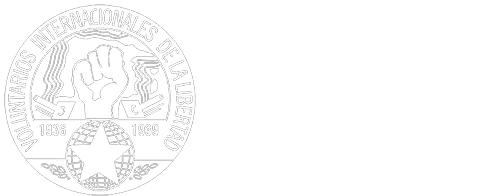International Brigade Memorial Trust
Nancy Phillips, member of the IBMT and the Friends and Family of the Abraham Lincoln Brigade (FFALB), tells the story of the Swiss aid worker who saved hundreds of children from the horrors of fascism in the 1930s and 40s, running a maternity hospital near the French-Spanish border. This piece was originally shared with the FFALB Google Group.

I recently received the announcement of a conference to be held in Le Boulou, France, this summer on the subject of ‘Enfants de la guerre’, that is, on Spanish children during the civil war and the Retirida', the mass retreat of refugees into France in early 1939. When I read the programme I was immediately reminded of the woman who had been one of the bright lights in those dark times. Her name was Elisabeth Eidenbenz, a Swiss aid worker who is credited with saving the lives of almost 600 children through her maternity hospital, in the French municipality of Elne.
Beginning in February 1939, more than 450,000 Spanish Republicans crossed the French-Spanish border, including many families with children. They were herded into camps that were initially called internment camps but were really concentration camps that were designed to imprison and control a massive interned population. The mortality rate for mothers and children was especially high. The camps were without adequate sanitary and hygienic conditions and it was difficult for mother and child to survive.
To relieve the suffering of pregnant women and children in the camps, a number of international aid organisations responded, including Swiss aid organisations. Elisabeth Eidenbenz was one of their volunteers. Elisabeth had been born in June 1913, the daughter of a Zurich pastor. She was a teacher and nurse before she decided to join the Swiss aid organization. She arrived in Spain in April 1937 but soon relocated to the South of France.
Appalled by the situation of mothers and children among the Spanish refugees in the Argelèrs camp, Elisabeth decided to convert an abandoned château just outside of Elne into a maternity home. She rented the chateau with 30,000 francs she obtained from the Aide Suisse aux Enfants organisation and saw to its repair and renovation. This was completed in November 1939. The first birth was in December 1939.
Elisabeth sought out the destitute pregnant refugee women and brought them to the maternity hospital in Elne to give birth. There the women, many of them brought from internment camps, could give birth in a welcoming environment. They typically spent a month in tranquility and relative comfort in the hospital preparing for the birth of their children and a month afterwards to recuperate while their babies gained strength. Afterwards Elisabeth tried to place them in a job to keep them out of the camps.
Initially the hospital functioned well thanks to donations from European countries, French individuals and humanitarian groups. But after the start of the Second World War, funds dwindled at the same time as refugees from France and the rest of Europe began to arrive in Elne, especially Jewish and Romani women; the roundup of Jews had begun in brutal earnest in November after the Germans occupied the so-called Free Zone.

In order to survive economically, the hospital associated itself with the Swiss Red Cross and from June 1942 was required to abide by its policy of strict neutrality for assistance to refugees. This rule would have prevented Elne's maternity hospital from sheltering political refugees, Romanis and Jews. Elisabeth was ordered ‘to give up Jews, Tziganes and Spanish refugees if you are requested to and do nothing to shield them from the roundups.’
Elisabeth and staff showed their real bravery when they decided that the identity of most of the refugees would be hidden in order to circumvent these rules. To accomplish this, many Jewish mothers gave their children Spanish first and last names to deceive the French police or the Gestapo. Elisabeth always closed her eyes and accepted the names given by the families. Some 400 Spanish children and 200 Jews from Europe were saved throughout this period.
The Gestapo closed Elne's maternity hospital at the end of April 1944. The last of the 597 babies born there, on 30 April 1944, was named Danielle Louise.
Elisabeth did not receive any recognition for her work until the last few years of her life. In 2002 she returned to Elne for a moving ceremony organised by the town’s mayor where she met some 30 mothers from her former ‘family’. She received the Medal of the Just among Nations from Israel’s Consul in Marseille, the Star of the Légion d’Honneur from the French government, La Médaille de l’Ordre Civil et de la Solidarité from the Spanish government and the Croix de Saint Jordi from the Generalitat of Catalonia. The former Elne maternity hospital was opened to the public as a memorial and museum in 2012. The Les Corts district in Barcelona named a street after her next to the La Maternitat hospital site. Elisabeth died in May 2011 in Zürich at the age of 98.
Posted on 5 April 2023.
